新目标九年级英语语法总结Unit1
人教版新目标初三英语九年级第一单元单词语法知识点总结
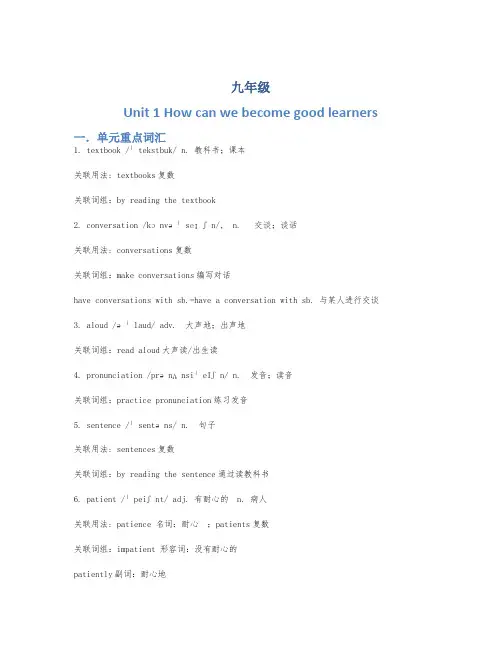
九年级Unit 1 How can we become good learners一.单元重点词汇1.textbook /ˈtekstbuk/ n. 教科书;课本关联用法: textbooks复数关联词组:by reading the textbook2.conversation /kɔnvəˈs eɪʃn/, n. 交谈;谈话关联用法: conversations复数关联词组:make conversations编写对话have conversations with sb.=have a conversation with sb. 与某人进行交谈3.aloud /əˈlaud/ adv. 大声地;出声地关联词组:read aloud大声读/出生读4.pronunciation /prənʌnsiˈeIʃn/ n. 发音;读音关联词组:practice pronunciation练习发音5.sentence /ˈsentəns/ n. 句子关联用法: sentences复数关联词组:by reading the sentence通过读教科书6.patient /ˈpeiʃnt/ adj. 有耐心的 n. 病人关联用法: patience 名词:耐心;patients复数关联词组:impatient 形容词:没有耐心的patiently副词:耐心地be patient with sb.对某人有耐心be patient of sth.对某事能容忍have (no) patience with…对…(没)有耐心lose patience with 对…失去耐心out of patience 没有耐心7.expression /ikˈspreʃn/ n. 表达(方式);表示关联用法:expressions复数关联词组:facial expressions 面部表情8.discover /dIˈskʌvə (r)/ v. 发现;发觉关联用法:discovery 名词:发现9.secret /ˈsi:krət/ n. 秘密;adj. 秘密的;保密的关联用法:secrets复数关联词组:in secret秘密地;keep a secret保密;a secret plan秘密的计划10.look up (在词典,参考书中或通过电脑)查阅;抬头看11.fall in love with 爱上;与⋯⋯相爱12.grammar /ˈgræmə (r)/ n. 语法关联词组:in grammar在语法方面13.repeat /riˈpi:t/ v. 重复;重做关联用法:secrets复数关联词组:repetition名词:重复14.note /nəut/ n. 笔记;记录 v.注意;指出关联用法:notes复数关联词组:please note 清注意;take notes记笔记15.pal /pæl/ n.朋友;伙伴关联词组:penpal笔友16.physics /ˈfiziks/ n. 物理;物理学关联单词:adj. 物理的;身体的;物质的;根据自然规律的,符合自然法则的关联词组:Space Physics 空间物理学物理空间空间物理17.chemistry /ˈkemistri/ n. 化学关联词组:Organic Chemistry 有机化学18.memorize /ˈmeməˌraɪz/ v 记住;记忆关联单词:memory n.记忆关联用法:过去式 memorized过去分词 memorized现在分词 memorizing第三人称单数memorizes典型例句:Have you memorized your lines for the play yet?你记住剧本中的台词了吗?19.pattern /ˈpætn/, /ˈpætən/ n.模式;方式20.pronounce /prəˈnaʊns/ v. 发音关联用法:过去式 pronounced过去分词 pronounced现在分词pronouncing第三人称单数 pronounces关联词组:Pronounce correctly 发音正确正确发音典型例句:I can not pronounce correctly 我不能正确发音21.increase /Inˈkri:s/ v. 增加;增长关联用法:过去式 increased过去分词 increased现在分词 increasing复数 increases第三人称单数 increasesn. 增加;增多;增长关联词组:increase by 增加了;按…增长on the increase 正在增加,正在增长22.speed /spi:d/ n.速度 v.加速关联单词:speeding超速关联用法:过去式 sped或speeded过去分词 sped或speeded现在分词 speeding关联词组:speed up 加速加快速度使加速加快speed limit 速度限制时速限制限速最高车速23.partner /ˈpa:(r)tnə (r)/ n. 搭档;同伴24.born /bɔːn/ v.出生 adj.天生的关联词组:be born with 天生具有born yesterday 乳臭未干典型例句:Swift was born in 1667.斯威夫特生于1667年。
Unit1语法知识点九年级英语上册
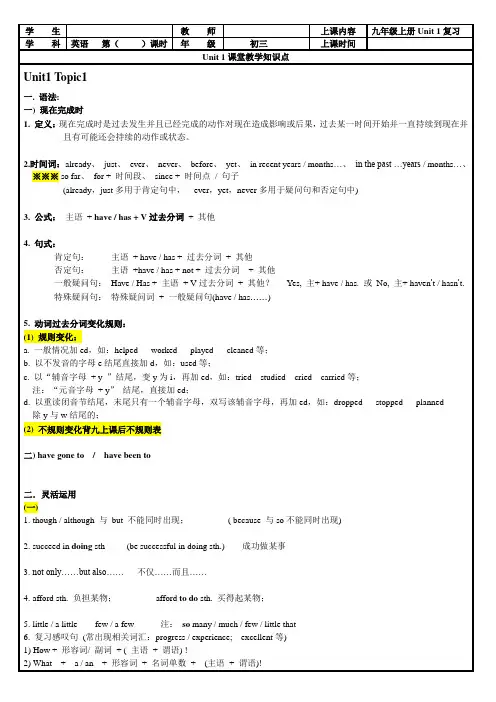
学生教师上课内容九年级上册Unit 1复习学科英语第()课时年级初三上课时间Unit 1课堂教学知识点Unit1 Topic1一. 语法:一) 现在完成时1. 定义:现在完成时是过去发生并且已经完成的动作对现在造成影响或后果,过去某一时间开始并一直持续到现在并且有可能还会持续的动作或状态。
2.时间词:already、just、ever、never、before、yet、in recent years / months…、in the past …years / months…、※※※so far、for + 时间段、since + 时间点/ 句子(already,just多用于肯定句中,ever,yet,never多用于疑问句和否定句中)3. 公式:主语+ have / has + V过去分词+ 其他4. 句式:肯定句:主语+ have / has + 过去分词+ 其他否定句:主语+have / has + not + 过去分词+ 其他一般疑问句:Have / Has + 主语+ V过去分词+ 其他?Yes, 主+ have / has. 或No, 主+ haven’t / hasn’t.特殊疑问句:特殊疑问词+ 一般疑问句(have / has……)5. 动词过去分词变化规则:(1) 规则变化:a. 一般情况加ed,如:helped worked played cleaned等;b. 以不发音的字母e结尾直接加d,如:used等;c. 以“辅音字母+ y ”结尾,变y为i,再加ed,如:tried studied cried carried等;注:“元音字母+ y”结尾,直接加ed;d. 以重读闭音节结尾,末尾只有一个辅音字母,双写该辅音字母,再加ed,如:dropped stopped planned除y与w结尾的;(2) 不规则变化背九上课后不规则表二) have gone to / have been to二.灵活运用(一)1.though / although 与but 不能同时出现;( because 与so不能同时出现)2.succeed in doing sth (be successful in doing sth.) 成功做某事3.not only……but also……不仅……而且……4.afford sth. 负担某物;afford to do sth. 买得起某物;5.little / a little few / a few 注:so many / much / few / little that6. 复习感叹句(常出现相关词汇:progress / experience; excellent等)1) How + 形容词/ 副词+ ( 主语+ 谓语) !2) What + a / an + 形容词+ 名词单数+ (主语+ 谓语)!What + 形容词+ 名词不可数或名词复数+ (主语+ 谓语)!(二)1.must 如:It must be fun. (还有两个表猜测用法的情态动词:may /can’t )2.take part in = join in = be in 与join区别3.不定代词+ adj. 如:something meaningful4.spend 、take、cost、pay5.in the 1960s 二十世纪六十年代in the early / late 1960s 二十世纪六十年代初/ 末6.7.others, the others , other, the other,another用法8.enough + n. adj. / adv. + enough9.put on、put up、put away三.词性转换rapid rapidly succeed success successful successfullymedicine medical please pleased (un) pleasantpleasure四.固定搭配1. take place发生,进行2. make (rapid) progress 取得(快速的)进步3. keep in touch with sb. 和某人保持联系(get in touch with sb. 和某人取得联系)4. see the changes oneself (herself / himself /……) 亲眼见证变化5. in recent years 在近几年6. satisfy people’s needs 满足人们的需求7. play chess 下象棋8. have a chance to receive a good education 有机会接受好的教育9. enjoy good medical care 享受好的医疗护理10. far away 远离的,遥远的11. by letter or telegram 通过信件或电报(by + Ving) ※※※12. play an important part in people’s lives / doing sth. 在人们的生活中/做某事起重要的作用13. in one’s spare / free time 在某人的空闲时间14. have no time to travel没时间旅行15. places of interest名胜古迹16. W hat’s more 而且17. volunteer activities 自愿者活动18. ring roads 环路19. more than forty years = over forty years 四十多年20. by the way顺便说一下五.重点句型1. Did you have a good summer holiday? 你有一个愉快的暑假吗?2. How was your trip? 你的旅行怎么样?3. Great changes have taken plac e there and my hometown has bee more and more beautiful.那儿发生了巨大的变化并且我的家乡变得越来越美了。
人教版(新目标)初中英语九年级上册Unit1知识点汇总
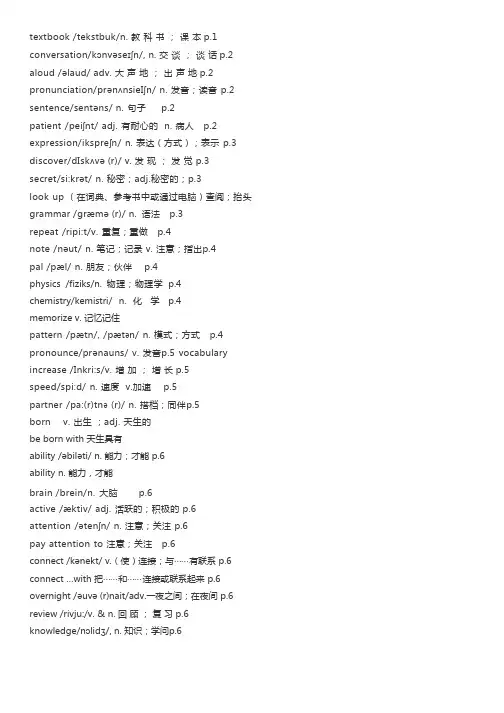
textbook /tekstbuk/n. 教科书;课本 p.1 conversation/kɔnvəseɪʃn/, n. 交谈;谈话 p.2 aloud /əlaud/ adv. 大声地;出声地 p.2 pronunciation/prənʌnsieIʃn/ n. 发音;读音p.2 sentence/sentəns/ n. 句子p.2patient /peiʃnt/ adj. 有耐心的n. 病人p.2 expression/ikspreʃn/ n. 表达(方式);表示p.3 discover/dIskʌvə(r)/ v. 发现;发觉 p.3secret/si:krət/ n. 秘密;adj.秘密的;p.3look up (在词典、参考书中或通过电脑)查阅;抬头grammar /græmə(r)/ n. 语法p.3repeat /ripi:t/v. 重复;重做p.4note /nəut/ n. 笔记;记录 v. 注意;指出p.4pal /pæl/ n. 朋友;伙伴p.4physics /fiziks/n. 物理;物理学p.4chemistry/kemistri/ n. 化学p.4memorize v. 记忆记住pattern /pætn/,/pætən/ n. 模式;方式p.4 pronounce/prənauns/ v. 发音p.5 vocabulary increase /Inkri:s/v. 增加;增长 p.5speed/spi:d/ n. 速度 v.加速p.5partner /pa:(r)tnə(r)/ n. 搭档;同伴p.5born v. 出生;adj. 天生的be born with 天生具有ability /əbiləti/ n. 能力;才能 p.6ability n. 能力,才能brain /brein/n. 大脑p.6active /æktiv/ adj. 活跃的;积极的 p.6attention /ətenʃn/ n. 注意;关注 p.6pay attention to 注意;关注p.6connect /kənekt/ v.(使)连接;与⋯⋯有联系 p.6 connect …with 把⋯⋯和⋯⋯连接或联系起来 p.6 overnight /əuvə(r)nait/adv.一夜之间;在夜间 p.6 review /rivju:/v. & n. 回顾;复习 p.6 knowledge/nɔlidʒ/, n. 知识;学问p.6leftlong adj. 终生的;毕生的wisely /waizli/adv. 明智地;聪明地 p.6Annie /æni/安妮(女名)p.2Alexander GrahamBell 格雷厄姆•贝尔 p.602U n i t 1 知识梳理Unit 1 How can we become good learners?【重点短语】1.good learners 优秀的学习者2.work with friends 和朋友一起学习3. study for a test 备考4.have conversations with 与……交谈5.speaking skills 口语技巧6.a little 有点儿7.a t first 起初起先8.t he secret to ............ 的秘诀9.b ecause of 因为10.as well 也11.look up 查阅;抬头看12.so that 以便,为了13.the meaning of ……的意思14.make mistakes 犯错误15.talk to 交谈16.depend on 依靠依赖17.in common 共有的18.pay attention to 注意关注19.connect …with …把……联系20.forexample 例如21.think about 考虑22.even if 即使尽管纵容23.look for 寻找24.worry about 担心担忧25.make word cards 制作单词卡片26.ask the teacher for help 向老师求助27.read aloud 大声读28.spoken English 英语口语29.give a report 作报告30.word by word 一字一字地31.so……that 如此……以至于32.fallin love with 爱上33.something interesting 有趣的事情34.take notes 记笔记35.how often 多久一次36.a lot of 许多37.the ability to do sth. 做某事的能力38.learning habits 学习习惯39.be interested in 对……感兴趣40.get bored 感到无聊【重点句型】1.提建议的句子:①What/ how about +doing sth.? 做…怎么样?如:What/ How about going shopping?②Why don't you + do sth.? 你为什么不做…?如:Why don't you go shopping?③Why not + do sth. ? 为什么不做…?如:Why not go shopping?④Let's + do sth. 让我们做…吧。
2020人教新目标版九年级英语上unit1单元知识点(短语+句型+重难点句子+语法)
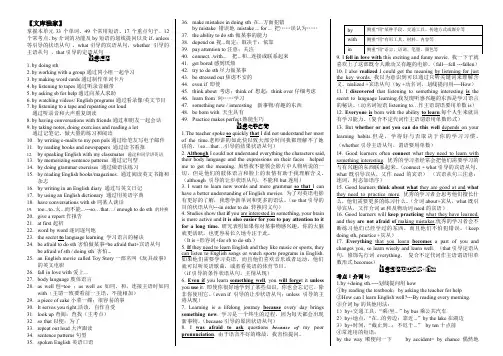
【文库独家】掌握本单元33个单词、49个常用短语、17个重点句子、12个常考点。
by介词的功能及by短语的划线提问以及if、unless 等引导的状语从句,what引导的宾语从句,whether 引导的主语从句,that引导的定语从句重点短语1.by doing sth2.by working with a group通过同小组一起学习3.by making word cards通过制作单词卡片4.by listening to tapes通过听录音磁带5.by asking sb for help通过向某人求助6.by watching videos/ English programs通过看录像/英文节目7.by listening to a tape and repeating out loud通过听录音和大声重复朗读8.by having conversations with friends通过和朋友一起会话9.by taking notes, doing exercises and reading a lot通过记笔记、做大量的练习和阅读10.by writing e-mails to my pen pals通过给笔友写电子邮件11.by reading books and newspapers 通过读书看报12.by speaking English with my classmates 通过和同学讲英语13.by memorizing sentence patterns 通过记句型14.by doing grammar exercises 通过做语法练习15.by reading English books/magazines. 通过阅读英文书籍和杂志16.by writing in an English diary 通过写英文日记17.by using an English dictionary 通过用英语字典18.have conversations with sb同某人谈话19.too...to..太...而不能...---so…that…/ enough to do sth 的转换20.give a report作报告21.at first起初22.word by word逐词逐句地23.the secret to language learning 学习语言的秘诀24.be afraid to do sth害怕做某事=be afraid that+宾语从句be afraid of sth / doing sth 害怕…25.an English movie called Toy Story一部名叫《玩具故事》的英文电影26.fall in love with爱上...27.body language肢体语言28.as well也=too ;as well as 如同、和,连接主语时如同with(主谓一致要看前一主语,不能相加)29. a piece of cake小菜一碟;很容易的事30.It serves you right.活该,自作自受31.look up查阅;查找(主考点)32.so that以便;为了33.repeat out loud大声跟读34.sentence patterns句型35.spoken English英语口语36.make mistakes in doing sth 在...方面犯错by mistake 错误地mistake … for …把……误认为……37.the ability to do sth做某事的能力38.depend on视...而定;取决于;依靠39.pay attention to注意;关注40.connect...with... 把...和...连接或联系起来41.get bored感到厌烦42.try to do sth尽力做某事43.be stressed out焦虑不安的44.even if 即使45.think about 考虑;think of 想起;think over仔细考虑46.learn from 向……学习47.something new / interesting 新事物/有趣的东西48.be born with 天生具有49.Practice makes perfect.熟能生巧重点句子必背1.The teacher spoke so quickly that I did not understand her mostof the time.老师讲的如此快以致大部分时间我都理解不了她讲的。
九年级全册 U1U3重点句型,语法,短语总结 人教新目标版
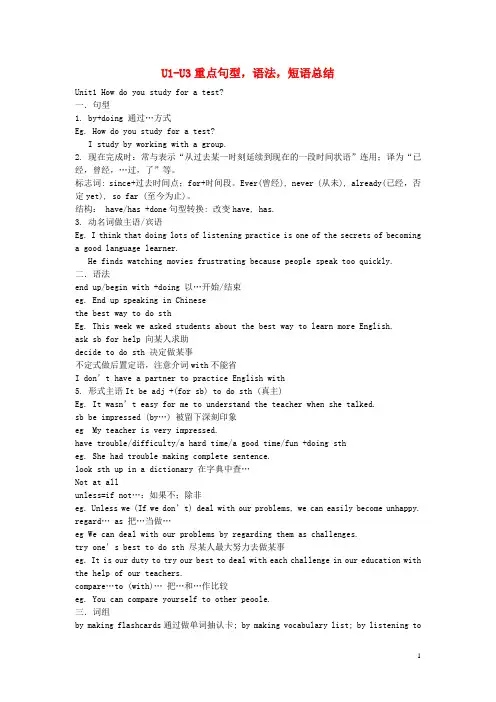
U1-U3重点句型,语法,短语总结Unit1 How do you study for a test?一.句型1. by+doing 通过…方式Eg. How do you study for a test?I study by working with a group.2. 现在完成时:常与表示“从过去某一时刻延续到现在的一段时间状语”连用;译为“已经,曾经,…过,了”等。
标志词: since+过去时间点;for+时间段。
Ever(曾经), never (从未), already(已经,否定yet), so far (至今为止)。
结构: have/has +done句型转换: 改变have, has.3. 动名词做主语/宾语Eg. I think that doing lots of listening practice is one of the secrets of becoming a good language learner.He finds watching movies frustrating because people speak too quickly. 二.语法end up/begin with +doing 以…开始/结束eg. End up speaking in Chinesethe best way to do sthEg. This week we asked students about the best way to learn more English.ask sb for help 向某人求助decide to do sth 决定做某事不定式做后置定语,注意介词with不能省I don’t have a partner to practice English with5. 形式主语It be adj +(for sb) to do sth (真主)Eg. It wasn’t easy for me to understand the teacher when she talked.sb be impressed (by…) 被留下深刻印象eg My teacher is very impressed.have trouble/difficulty/a hard time/a good time/fun +doing stheg. She had trouble making complete sentence.look sth up in a dictionary 在字典中查…Not at allunless=if not…:如果不;除非eg. Unless we (If we don’t) deal with our problems, we can easily become unhappy. regard… as 把…当做…eg We can deal with our problems by regarding them as challenges.try one’s best to do sth 尽某人最大努力去做某事eg. It is our duty to try our best to deal with each challenge in our education with the help of our teachers.compare…to (with)… 把…和…作比较eg. You can compare yourself to other peoole.三.词组by making flashcards通过做单词抽认卡; by making vocabulary list; by listening totapes; by reading the textbook; by asking the teacher for help; by watching English-language videos; by practicing conversation with friends; by reading aloud to practice pronunciationkeep an English notebook / take notes记英语笔记/记笔记read aloud 朗读that way (=in that way) 通过那种方式improve my speaking skills提高我的会话技巧have conversations with friends与朋友对话get excited 高兴,激动do/make a survey about… 做有关…的调查spoken English (= oral English) 英语口语make mistakes in sth在…犯错误get the pronunciation right 使发音准确get a lot of /much writing practice 得到大量写作练习first of all/at first 首先later on 随后write down 写下,记下make up conversations 编写对话all over/around the world 全世界deal with 对待,处理,解决worry about (be worried about) 担心,担忧be angry with / be mad at生某人的气; be/stay/keep angry 生气go by 消逝 Time goes by. 时光飞逝complain about/of 抱怨…with the help of 在…的帮助下change…into… 把…变成… (= turn into)face the challenges 面对挑战break off a friendship中断一场友谊Unit 2 I used to be afraid of the dark.一.句型1. used to + do/be 过去常常… 否定:didn’t use to; don’t use to 疑问:did…use toEg. You used to be short, didn’t you?be/get used to doing 习惯于…eg. I used to traveling by air.2. in(during) the last(past) few years 在过去的几年里, 用于现在完成时Eg. My life has changed a lot in the last few years.3. not …anymore=no more not…any longer=no longerEg. I don’t have time anymore.= I no more have time.4. seem + adj / to do/ that(从句)It (必须it作主语)seems that she has changed a lot.She seems (like) to have changed a lot.5. pride(n)/proud(adj)A is proud of B= A takes pride in B: A以B为骄傲B is the proud of A: B 是A 的骄傲Eg. Her daughter is the proud of her.She is proud of/takes pride in her daughter.6. 感叹句How+ adj + 主语+谓语!eg. How beautiful she is!What + n + 主语+谓语! What a beautiful girl she is!二.语法with …on/offEg. I go to sleep with my bedroom light on.be afraid of = be terrified of= be afraid to doEg. I used to be afraid of going outside at night.spend/takeafford to do sth 能够负担起…eg. His mother couldn’t afford to pay for her child’s education. patient: be patient with sb 对…有耐心even though, even if:即使…让步状语从句(有时遵循主将从现)eg. Even though/if it rains, he will go to school.三.词组be more interested in 对…更感兴趣.on the swim team 游泳队的队员.worry about. 担心in the past 在过去(过去式)all the time 一直, 总是chat with 与…闲聊hardly ever 几乎从不,很少(表否定)stressed out 紧张,压力大head teacher 校长cause/make a lot of trouble 制造许多麻烦get into trouble with 与…遇到麻烦make a (difficult) decision 做出决定to one’s surprise 使某人吃惊的是to do this 为了做到这一点(常做状语)as well as one can 尽可能的做好pay attention to 留心, 注意consist of 由…组成/构成.instead of 代替, 而不是in the end; at last; finally最后, 终于give up doing sth 放弃做某事feel good about oneself 觉得很棒daily life 日常生活Unit 3 Teenagers should be allowed to choose their own clothes. 句型被动语态: sth be +done by sbeg. Football is played by people in most countries.含有情态动词的被动语态should/can(not) + be doneeg. Teenagers should be allowed to choose their own clothes.instead, instead of 代替,而不是eg: They are not studying. They are chatting with each other instead.They are chatting with each other instead of studying.so +be/助动词/情态动词(取决于上句的谓语动词,单复数取决于后面的主语)+另一主语表“也是如此”。
新目标人教版英语九年级1-3单元语法总结
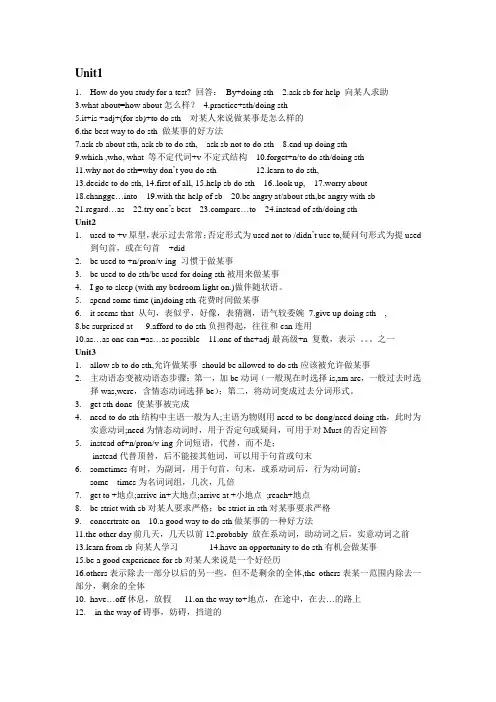
Unit11.How do you study for a test? 回答:By+doing sth2.ask sb for help 向某人求助3.what about=how about怎么样?4.practice+sth/doing sth5.it+is +adj+(for sb)+to do sth 对某人来说做某事是怎么样的6.the best way to do sth 做某事的好方法7.ask sb about sth, ask sb to do sth, ask sb not to do sth 8.end up doing sth9.which ,who, what 等不定代词+v不定式结构10.forget+n/to do sth/doing sth11.why not do sth=why don’t you do sth 12.learn to do sth,13.decide to do sth, 14.first of all, 15.help sb do sth 16..look up, 17.worry about18.changge…into 19.with the help of sb 20.be angry at/about sth,be angry with sb21.regard…as 22.try one’s best pare…to 24.instead of sth/doing sthUnit2ed to +v原型,表示过去常常;否定形式为used not to /didn’t use to,疑问句形式为提used到句首,或在句首+did2.be used to +n/pron/v-ing 习惯于做某事3.be used to do sth/be used for doing sth被用来做某事4.I go to sleep (with my bedroom light on.)做伴随状语。
新目标人教版九年级英语上册Unit1全单元知识点归纳
Unit 1 How can we become good learners?课文知识点解析“by+doing 形式”表示方式、方法拓展:介词by 的其他用法:1)by+交通工具,“乘/坐...” by bus2)by+地点,“在...的旁边;靠近...” by the lake3)by+时间,“截止到...;不迟于...” by ten4)辨析by 、with 、in ,“用”Eg. We ’ll be traveling by car.He broke the window with a stone.Please answer the question in English.即学即练:1.-How do you learn English words? -_____making word cards.A. ToB. ByC. ForD. With2.-How do you get to school every day. Lucy? -I go to school _____.A.ride my bikeB.by my bikeC.by busD.by a bus3. Mr.Scott made a living by____(sell) old things.4. She learns English by listening to tapes.(对划线部分提问)_____ ______ she learn English?5. Most of them take the train to work.(改为同义句)Most of them go to work ______ ______.要点详解:Section A1.by asking the teacher for help通过向老师求助。
(P1)1)by,“通过;靠”,后加名词/代词/动名词。
Eg. He had to do all the work by hand.2)ask (sb)for sth,“向某人要某物;要求某人某事”。
九年级英语unit1语法知识点
九年级英语unit1语法知识点九年级英语Unit 1语法知识点对于九年级的学生来说,英语学习基础已经打下了坚实的基础,Unit 1则是在此基础上进一步拓宽语法知识的阶段。
在这个单元中,有许多重要的语法知识点需要掌握,下面将为大家详细介绍。
1. 一般现在时一般现在时是英语中最基本的时态,用来表达经常性的行为、习惯、常识等。
它的构成主要是根据句子的主语使用动词的原形,而且第三人称单数的主语要加上“-s”。
例如:She often goes to the park on Sundays.2. 现在进行时现在进行时表示目前正在进行的动作,它的构成主要是由“be”动词加上现在分词来表示。
同时,现在进行时也可以用来表示即将发生或即将安排的动作。
例如:He is studying English in the library.3. 一般过去时一般过去时用来表示过去发生的动作或存在的状态。
它的构成主要是根据句子的主语使用动词的过去式,同时肯定句中要使用助动词“did”。
例如:They visited their grandparents last weekend.4. 过去进行时过去进行时表示在过去某个时间段正在进行的动作。
它的构成主要是由“was/were”动词加上现在分词来表示。
例如:I was watching TV when he called me.5. 一般将来时一般将来时主要用来表达将来的动作或事情。
它的构成主要是由“will/shall”加上动词原形来表示。
例如:We will have a picnic next Sunday.6. 情态动词情态动词可以用来表达能力、可能性、推测以及许可等。
常见的情态动词有can、may、must、shall、will等。
值得注意的是,情态动词后面的动词使用原形。
例如:You must finish your homework.7. 句型及从句九年级的学生还需要学习掌握一些常见的句型和从句的用法。
新目标(Goforit)版九年级Unit1Howcanwebecomegoodlearners_L5
usinganEnglishdictionary
…
观察与思考:
观察以上对话和GrammarFocus内容,请思考:询问学习方法时,常使用
___H_o__w_d__o_y_o_u_…__?______句型提问;回答常用by+__d_o__in_g_结构来表达。
Fillintheblankswiththewordsinthebox.
Thefirstwayis_________________________________________ Thesecondwayis______________________________________ Thethirdwayis_________________________________________
b.Bylisteningtoatapeandrepeatingou tloud.
3.Howimproveyourwriting? 4.Howdoyoupracticelistening?
c.Byhavingconversationswithfrien ds. d.Bytakingnotes,doingexercisesa ndreadingalot.
3.Meipingdoesn’tknowmanyEnglishwords.
Shecouldlearnmorewords____b_y_m__a_k_in__g_w__o_r_d_c_a_rds.
Lastquestion,howcanIwrit ingalettertomyfriends.Giv ehim/hersomeadviceabou tthebestwaytostudyEnglis
h?
你Do通yo过u大lea声rn读E来ng学lis英hby rea语di吗ng?aloud?
Unit1+知识清单+-2024-2025学年人教版九年级英语全册
中考一轮复习人教新目标Go For It!九年级上册英语Unit 1单元总结一、词汇(附例句)textbook教科书;课本Read the textbook carefully before the test.conversation交谈;谈话We had a nice conversation about the movie last night.aloud大声地;出声地Please read the poem aloud so everyone can hear.pronunciation发音;读音She worked hard to improve her pronunciation.sentence句子The teacher asked us to make a sentence with the new word. patient有耐心的(adj.);病人(n.)Be patient with your child while they are learning. (adj.)She is a patient in the hospital. (n.)expression表达(方式);表示Her facial expression showed her happiness.discover发现;发觉I discovered a new book at the library yesterday.secret秘密;秘密的(adj.)She kept her secret to herself. (n.)This is a secret room in the house. (adj.)grammar语法I need to brush up on my grammar skills.repeat重复;重做Repeat the steps carefully to avoid mistakes.note笔记;记录(n.);注意;指出(v.)She took notes during the lecture. (n.)Please note that the deadline is next Friday. (v.)pal朋友;伙伴(非正式用语)My best pal and I have been friends since childhood.pattern模式;方式He found a pattern in the data that helped him solve the problem. physics物理学I enjoy studying physics because it's interesting.chemistry化学Chemistry is the study of matter and its interactions.partner搭档;同伴We worked on the project as partners.memorize记住;熟记Memorize these key points for the exam.increase增加;增长The population has increased significantly in recent years.speed速度(n.);加速(v.)She drove at a high speed on the highway. (n.)He sped up the car to pass the slow traffic. (v.)ability能力;才能She has a natural ability for music.brain大脑The brain is the control center of the body.active活跃的;积极的She is an active member of the school club.attention注意;关注Pay attention to the details of the problem.connect连接;与……有联系(v.);连接(n.)Connect the wires correctly to avoid sparks. (v.)The internet allows us to connect with people around the world. (n.) overnight一夜之间;在夜间The project was completed overnight by a team of experts.review回顾;复习She spent the evening reviewing her notes for the test. knowledge知识;学问She has a wealth of knowledge in ancient history.wisely明智地;聪明地He made a wise decision to invest in that company.二、短语知识(附例句)by making word cards 通过制作单词卡片释义:这是一种学习新单词的方法,通过制作卡片来加深记忆。
- 1、下载文档前请自行甄别文档内容的完整性,平台不提供额外的编辑、内容补充、找答案等附加服务。
- 2、"仅部分预览"的文档,不可在线预览部分如存在完整性等问题,可反馈申请退款(可完整预览的文档不适用该条件!)。
- 3、如文档侵犯您的权益,请联系客服反馈,我们会尽快为您处理(人工客服工作时间:9:00-18:30)。
新目标九年级英语语法总结Unit11. by + doing 通过……方式如:by studying with a groupby 还可以表示:"在…旁","靠近","在…期间"、"用,""经过","乘车"等如:I live by the river. I have to go back by ten o'clock.The thief entered the room by the window.The student went to park by bus.2. talk about 谈论,议论,讨论如:The students often talk about movie after class. 学生们常常在课后讨论电影。
talk to sb. === talk with sb. 与某人说话3. 提建议的句子:①What/ how about +doing sth.? 如:What/ How about going shopping?②Why don't you + do sth.? 如:Why don't you go shopping?③Why not + do sth. ? 如:Why not go shopping?④Let's + do sth. 如:Let's go shopping⑤Shall we/ I + do sth.? 如:Shall we/ I go shopping?1. a lot 许多常用于句末如:I eat a lot. 我吃了许多。
5.too…to 太…而不能常用的句型too+adj./adv. + to do sth.如:I'm too tired to say anything. 我太累了,什么都不想说。
6. aloud, loud与loudly的用法三个词都与"大声"或"响亮"有关。
①aloud是副词,重点在出声能让人听见,但声音不一定很大,常用在读书或说话上。
通常放在动词之后。
aloud没有比较级形式。
如: He read the story aloud to his son.他朗读那篇故事给他儿子听。
②loud可作形容词或副词。
用作副词时,常与speak, talk,laugh等动词连用,多用于比较级,须放在动词之后。
如:She told us to speak a little louder. 她让我们说大声一点。
③loudly是副词,与loud同义,有时两者可替换使用,但往往含有令人讨厌或打扰别人的意思,可位于动词之前或之后。
如: He does not talk loudly or laugh loudly in public. 他不当众大声谈笑。
7. not …at all 一点也不根本不如:I like milk very much. I don't like coffee at all.我非常喜欢牛奶。
我一点也不喜欢咖啡。
not经常可以和助动词结合在一起,at all 则放在句尾8. be / get excited about sth.=== be / get excited about doing sth.=== be excited to do sth. 对…感兴奋如:I am / get excited about going to Beijing.===I am excited to go to Beijing. 我对去北京感到兴奋。
9. ①end up doing sth 终止做某事,结束做某事如:The party ended up singing. 晚会以唱歌而结束。
②end up with sth. 以…结束如:The party ended up with her singing. 晚会以她的歌唱而告终。
10. first of all 首先. to begin with 一开始later on 后来、随11. also 也、而且(用于肯定句)常在句子的中间either 也(用于否定句)常在句末too 也(用于肯定句) 常在句末12. make mistakes 犯错如:I often make mistakes. 我经常犯错。
make a mistake 犯一个错误如:I have made a mistake. 我已经犯了一个错误。
13. laugh at sb. 笑话;取笑(某人)如:Don't laugh at me!不要取笑我!14. take notes 做笔记,做记录15. enjoy doing sth . 喜欢做…乐意做… She enjoys playing football.她喜欢踢足球。
enjoy oneself 过得愉快如:He enjoyed himself. 他过得愉快。
16. native speaker 说本族语的人17. make up 组成、构成18. one of +(the+ 形容词比较级)+名词复数形式…其中之一如:She is one of the most popular teachers. 她是最受欢迎的教师之一。
19. It's +形容词+(for sb. ) to do sth. (对于某人来说)做某事…如:It's difficult (for me ) to study English. 对于我来说学习英语太难了。
句中的it 是形式主语,真正的主语是to study English20. practice doing 练习做某事如:She often practice speaking English. 她经常练习说英语。
21. decide to do sth. 决定做某事如:LiLei has decided to go to BeiJing . 李雷已经决定去北京。
22. unless 假如不,除非引导条件状语从句如:You will fail unless you work hard..假如你不努力你会失败。
I won't write unless he writes first. 除非他先写要不我不写23. deal with 处理如:I dealt with a lot of problem.24. worry about sb./ sth. 担心某人/ 某事如:Mother worried about his son just now. 妈妈刚才担心他的儿子。
25. be angry with sb. 对某人生气如:I was angry with her. 我对她生气。
26. perhaps === maybe 也许27. go by (时间) 过去如:Two years went by. 两年过去了。
28. see sb. / sth. doing 看见某人正在做某事强调正在发生see sb. / sth. do 看见某人在做某事如:如:She saw him drawing a picture in the classroom.她看见他正在教室里画画。
29. each other 彼此30. regard… as … 把…看作为….如:The boys regarded Anna as a fool. 这些男孩把安娜看成傻瓜。
31. too many许多修饰可数名词如:too many girlstoo much许多修饰不可数名词如:too much milkmuch too太修饰形容词如:much too beautiful32. change…into…将…变为…如:The magician changed the pen into a book. 这个魔术师将这本书变为一本书。
33. with the help of sb. == with one's help 在某人的帮助下如:with the help of LiLei == with LiLei's help 在李雷的帮助下34. compare … to …把…与…相比如:Compare you to Anna, you are lucky.你和安娜相比,你是幸运的。
35. instead 代替用在句末,副词(字面上常不译出来)instead of sth. / doing sth. 代替,而不是用在句中,动词如:Last summer I went to Beijing. This year I'm going to Shanghai instead.去年夏天我去北京, 今年我将要去上海。
I will go instead of you. 我将代替你去。
He stayed at home instead of going swimming. 他呆在家里而不是去游泳。
新目标九年级英语语法总结Unit21. used to do sth. 过去常常做某事否定形式:didn't use to do sth. / used not to do sth.如:He used to play football after school. 放学后他过去常常踢足球。
Did he use to play football? Yes, I did. No, I didn't.He didn't use to smoke. 他过去不吸烟。
2. 反意疑问句①肯定陈述句+否定提问如:Lily is a student, isn't she?Lily will go to China, won't she?②否定陈述句+肯定提问如:She doesn't come from China, does she?You haven't finished homework, have you?③提问部分用代词而不用名词Lily is a student, isn't she?④陈述句中含有否定意义的词,如:little, few, never, nothing, hardly等。
其反意疑问句用肯定式。
如:He knows little English, does he?他一点也不懂英语,不是吗?They hardly understood it, did they?他们几乎不明白,不是吗?3. play the piano弹钢琴4. ①be interested in sth. 对…感兴趣②be interested in doing sth. 对做…感兴趣如:He is interested in math, but he isn't interested in speaking English. 他对数学感兴趣,但是他对说英语不感兴趣。
